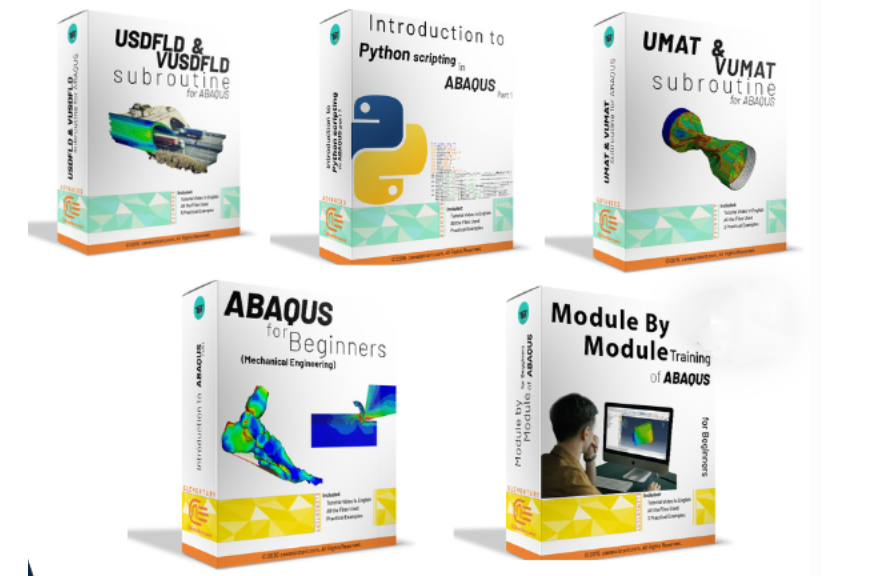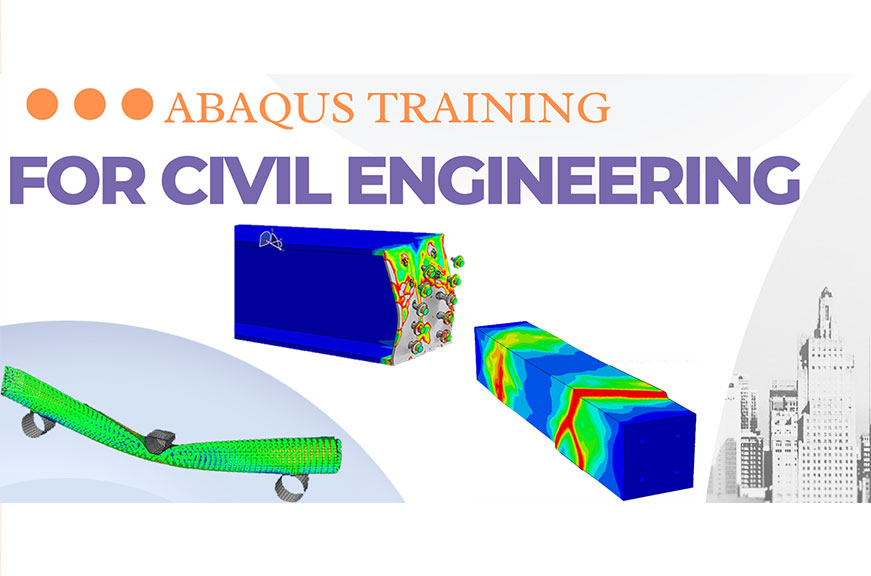Master Abaqus Course
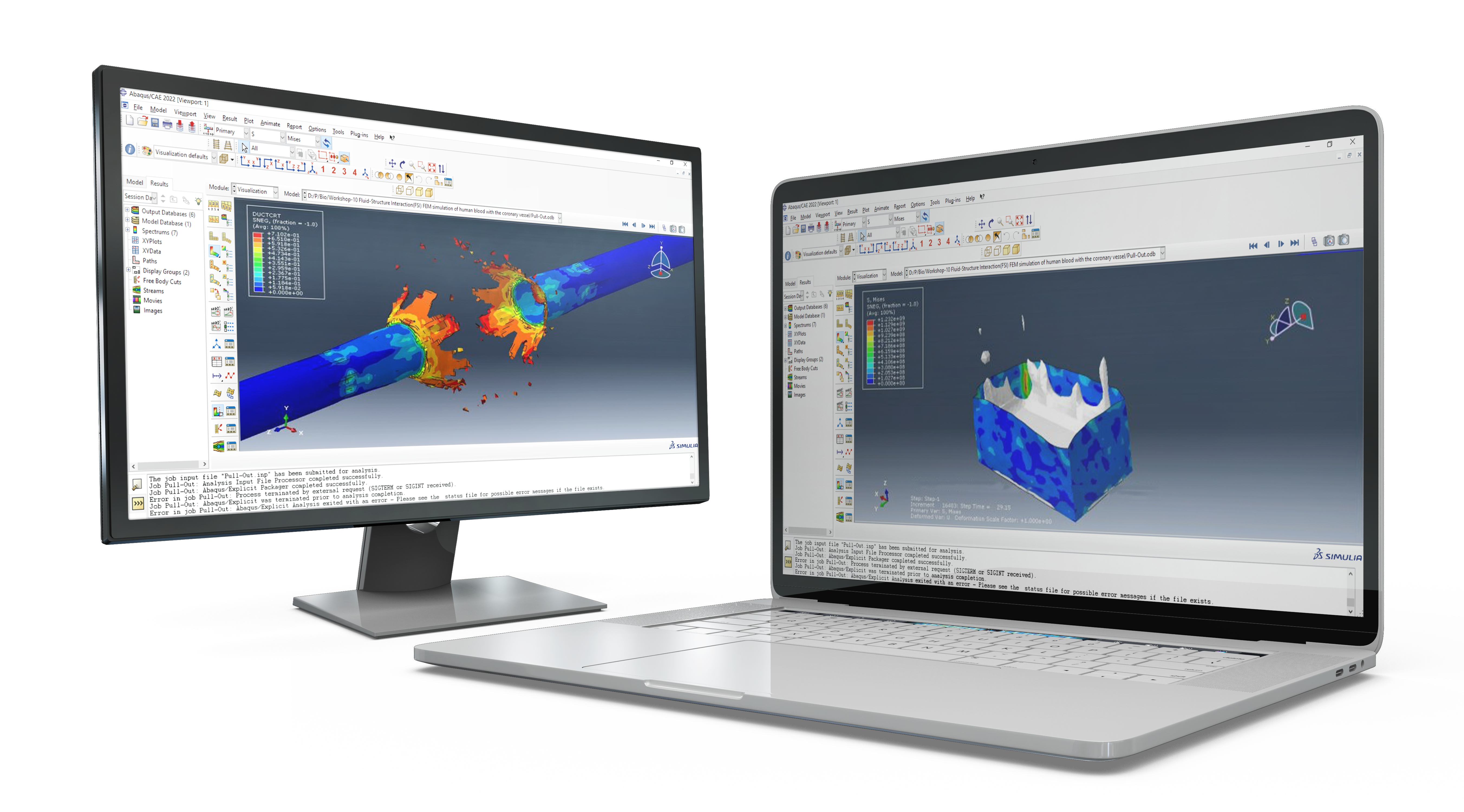
Comprehensive Online Abaqus Courses for Beginners & Professionals
CAE Assistant provides a variety of in-depth Abaqus courses online, designed for engineers of all experience levels. Whether you’re a beginner or a seasoned professional, our Abaqus course curriculum equips you with the knowledge and tools to conquer complex engineering challenges using Abaqus FEA.
Explore our comprehensive Abaqus course offerings or contact us today!
TOP ONLINE ABAQUS COURSES
Abaqus Online Course
An Abaqus online course offers much more than just a series of tutorial videos. Unlike typical video packages that you download and watch offline, our online course provides an interactive learning experience that’s constantly evolving. You’ll benefit from live sessions with expert instructors, immediate feedback on your assignments, and the opportunity to engage with a community of learners through forums and discussion groups.
Key Features of an Abaqus Online Course
An Abaqus online course provides a comprehensive learning experience tailored to both beginners and experienced users of Abaqus. These courses are designed to cover everything from the fundamentals to advanced techniques, making them an ideal choice for anyone looking to deepen their knowledge of finite element analysis (FEA).
Content Coverage:
An Abaqus online course typically begins with an introduction to Abaqus, covering the interface, essential tools, and fundamental concepts of FEA. As you progress, you’ll dive into modeling and simulation, learning how to create models, apply loads, and set up simulations for various types of analysis, including static, dynamic, and thermal. For those looking to push their skills further, advanced topics such as non-linear analysis, material modeling, fracture mechanics, and multi-physics simulations are often included. Real-world applications are a key focus, with case studies and examples that demonstrate how Abaqus is utilized in industry.
Learning Modes:
The interactive nature of an Abaqus online course sets it apart from traditional learning. Courses typically feature video lectures, either pre-recorded or live, that explain key concepts and demonstrate the software in action. To reinforce learning, hands-on exercises are provided, allowing you to practice using Abaqus to solve practical problems. Assignments and projects help solidify your understanding by applying what you’ve learned in real-world scenarios. Additionally, quizzes and exams are often included to assess your progress and ensure you’re mastering the material.
Levels:
Whether you’re new to FEA or an experienced engineer, there’s an Abaqus online course for you. Courses are available for beginners, who are just starting with Abaqus, intermediate users looking to deepen their understanding, and advanced users aiming to master complex analyses.
Instructors:
An Abaqus online course is usually taught by experts in FEA and computer-aided engineering (CAE). These instructors are often seasoned engineers, researchers, and professionals with extensive experience using Abaqus, ensuring that you’re learning from the best.
Certification:
Upon completing an Abaqus online course, many platforms offer a certification. This certification can be a valuable asset for your career, demonstrating your proficiency in Abaqus to potential employers.
Access and Flexibility:
One of the biggest advantages of an Abaqus online course is the flexibility it offers. Whether you prefer a self-paced learning environment, where you can progress through the material at your own speed, or scheduled classes with live sessions, there’s an option that suits your needs. Additionally, online courses provide access to a wealth of resources, including course materials, discussion forums, and additional tools like manuals and software licenses.
Who Should Take These Courses?
An Abaqus online course is perfect for engineering students seeking practical experience with FEA software, professional engineers wanting to enhance their skill set, researchers who rely on simulations, and industry professionals looking to apply Abaqus to specific projects or analyses.
Overall, an Abaqus online course offers a flexible, accessible, and in-depth way to learn this powerful software, helping engineers and researchers effectively apply FEA techniques in their work.
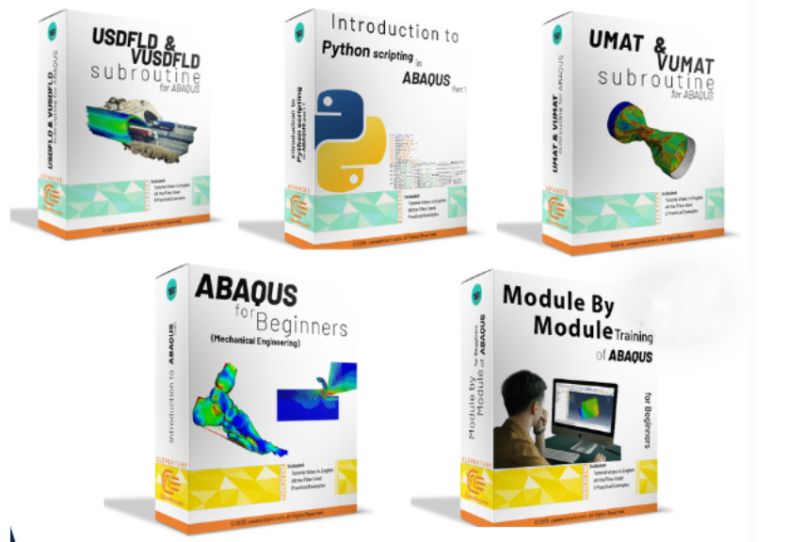
Foundations of finite element analysis (FEA)
COMPREHENSIVE ABAQUS COURSE FOR MECHANICAL ENGINEERING
Designed specifically for students new to FEA software, this course provides the essential training needed to confidently navigate Abaqus.
Enroll in first Session for free!
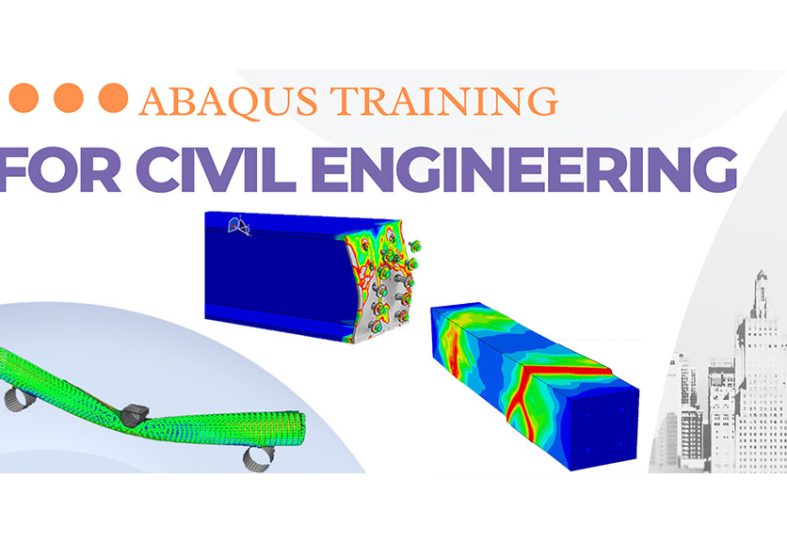
FROM FUNDAMENTALS TO PRACTICE
COMPREHENSIVE ABAQUS TUTORIAL FOR CIVIL ENGINEERS
Designed specifically for students new to FEA software, this course provides the essential training needed to confidently navigate Abaqus.
Enroll in first Session for free!

Deep Dive into Abaqus user defined simulations
ADVANCED ABAQUS SUBROUTINE COURSE
Designed specifically for Abaqus user, this course provides the 20 most used subroutines needed to confidently simulate advanced problems.
Enroll in first Session for free!

AUTOMATE YOUR ABAQUS WORKFLOWS | PYTHON FOR MECHANICAL ENGINEERS
ABAQUS PYTHON COURSE FOR SCRIPTING IN FEM SIMULATION
This course equips you to automate tasks, streamline workflows, and conduct advanced analyses in Abaqus by Command Line, Abaqus PDE, Macros, python and other methods.
Enroll in first Session for free!
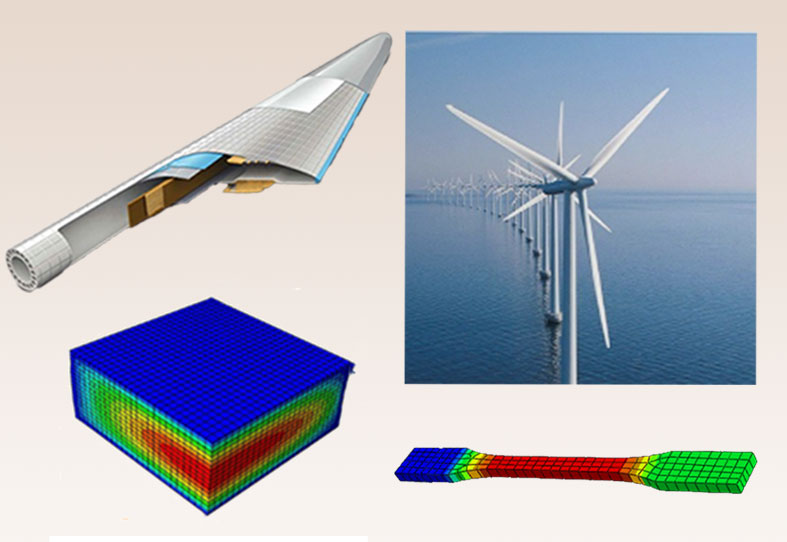
UNLOCK THE FULL POTENTIAL OF ABAQUS FOR ADVANCED COMPOSITE ANALYSIS
MASTER COMPOSITE MATERIAL SIMULATION IN ABAQUS
Learn to create precise models of unidirectional, woven, chopped, balsa wood, how to simulate damage, fatigue, curing or define custom material behavior with subroutines.
Enroll in first Session for free!

Abaqus Certification
Earning an Abaqus certification is a significant achievement for anyone looking to validate their skills and knowledge in finite element analysis (FEA) using Abaqus. This certification is more than just a credential; it’s a testament to your expertise in one of the most powerful simulation tools used in engineering today.
What Is Abaqus Certification?
An Abaqus certification demonstrates your ability to effectively use Abaqus for a wide range of engineering simulations. Whether you’re dealing with simple linear analysis or complex multi-physics simulations, this certification confirms that you have the skills necessary to tackle these challenges confidently. It covers essential areas such as modeling, simulation setup, result interpretation, and advanced techniques, ensuring that you’re well-versed in the software’s capabilities.
Why Pursue Abaqus Certification?
There are several compelling reasons to pursue an Abaqus certification. For one, it enhances your professional credibility, making you a more attractive candidate to employers in industries that rely on advanced simulations, such as aerospace, automotive, civil engineering, and more. This certification is recognized globally, meaning that your expertise will be acknowledged no matter where your career takes you. Additionally, achieving Abaqus certification can open doors to new career opportunities, promotions, and higher salary potential, as it reflects a high level of proficiency in a critical engineering tool.
The Certification Process:
The path to Abaqus certification typically involves completing a structured training program, which may include a mix of video lectures, hands-on exercises, and practical projects. These programs are designed to provide comprehensive knowledge of Abaqus, starting from the basics and advancing to more complex topics. After completing the course, you will be required to pass an examination that tests your understanding and practical skills. This exam often includes real-world scenarios where you must demonstrate your ability to use Abaqus effectively.
Levels of Abaqus Certification:
There are often different levels of Abaqus certification available, catering to various stages of expertise. For beginners, an entry-level certification focuses on foundational skills and basic simulations. As you progress, intermediate and advanced certifications delve deeper into specialized areas, such as non-linear analysis, fracture mechanics, and multi-physics simulations. This tiered approach allows you to build your skills progressively, earning certifications that match your growing expertise.
Who Should Consider Abaqus Certification?
An Abaqus certification is ideal for engineers, researchers, and professionals who use FEA in their work and want to formalize their skills with a recognized credential. It’s particularly beneficial for those looking to advance in their careers, whether by taking on more complex projects, transitioning into leadership roles, or seeking new job opportunities. Engineering students nearing graduation may also find that Abaqus certification gives them a competitive edge in the job market, as it signifies a higher level of preparedness for industry demands.
Abaqus Certification Course
Our Abaqus certification course is your gateway to becoming a certified expert in one of the most powerful finite element analysis tools available today. This course covers everything you need to know, from the basics of the software to advanced simulation techniques. With hands-on projects and personalized guidance, you’ll gain practical experience and the confidence to tackle real-world engineering problems. Upon completion, you’ll not only earn a valuable certification but also a deep understanding of how to leverage Abaqus for your engineering needs.
If you’ve been wanting to dive into the world of simulation and analysis, Abaqus is an excellent software to start with. This powerful tool, primarily used for Finite Element Analysis (FEA), is popular among engineers, researchers, and students alike. Whether you’re just starting out or already familiar with similar software, this guide will walk you through how to begin learning Abaqus (learn Abaqus) step by step.
1. Introduction to Abaqus
Abaqus is a software suite for modeling and simulating the behavior of materials under different physical conditions. It is widely used in industries like aerospace, automotive, civil engineering, and biomedical research. Abaqus allows users to analyze everything from simple structural problems to complex dynamic phenomena. Understanding how to leverage this software is crucial for anyone looking to excel in simulations and engineering design.
2. Why Learn Abaqus?
Learning Abaqus (learn Abaqus) not only adds a valuable skill to your portfolio but also enhances your ability to analyze real-world problems. For students and professionals in engineering, mastering Abaqus can open doors to more advanced simulations, deeper analytical capabilities, and better project results. Plus, knowing how to use Abaqus makes you more competitive in the job market, especially in fields related to mechanical, civil, and aerospace engineering.
3. Steps to Begin Learning Abaqus
Starting your journey with Abaqus may seem a bit overwhelming at first, but breaking it down into manageable steps makes it much easier. From familiarizing yourself with the software interface to utilizing tutorials, these steps will set the foundation for mastering Abaqus efficiently. Let’s explore how you can get started with this powerful simulation tool and learn Abaqus.
Familiarize Yourself with Abaqus Interface
The first step to learning Abaqus is getting comfortable with its user interface. Like many software tools, Abaqus has a learning curve, but don’t let that intimidate you. Start by exploring the layout and tools. You’ll find menus for modeling, analysis, and results. Abaqus is known for its versatility, and with a bit of patience, you’ll get a solid grasp of its interface.
Spend some time playing around with simple models, like beams or plates. This will help you get a feel for the software without diving into complex simulations right away. As you familiarize yourself with the interface, you will begin to understand the workflow and the powerful features Abaqus offers.
Start with Abaqus Tutorials and Guides
There are a plethora of free and paid resources available to learn Abaqus. The best way to start is by following tutorials. Official Abaqus tutorials are detailed and offer a hands-on approach to learning the software. You can find step-by-step guides that will teach you the fundamentals, such as creating models, defining material properties, and running analyses.
Additionally, there are video tutorials on platforms like YouTube that walk you through different projects. Visual learning can often make it easier to grasp complex concepts quickly.
4. Essential Skills for Learning Abaqus
To truly harness the capabilities of Abaqus, it’s important to build a strong foundation of essential skills. These skills go beyond just learning the software interface—they also include understanding core concepts like Finite Element Analysis (FEA) and Abaqus’ fundamental features. Developing these abilities will ensure you’re equipped to tackle more complex simulations down the line.
Understanding Finite Element Analysis (FEA)
To use Abaqus effectively, it’s important to have a basic understanding of Finite Element Analysis (FEA). FEA is a method of breaking down complex problems into smaller, manageable elements. Abaqus excels in this domain by allowing you to model complex geometries, apply forces, and analyze the stresses and strains in a material.
If you’re new to FEA, don’t worry. There are many online resources that can help you grasp the core concepts. Understanding FEA will enable you to fully leverage Abaqus’ capabilities, as it forms the backbone of most analyses done in the software.
Basic Commands and Features in Abaqus
Once you’re familiar with the interface and FEA basics, it’s time to dive deeper into Abaqus’ commands and features. Some of the core functions you’ll need to master include creating parts, assigning materials, meshing, applying loads and boundary conditions, and running simulations.
Start with simple projects like simulating the bending of a beam or the pressure on a plate. These exercises will introduce you to Abaqus’ most important features while reinforcing your understanding of FEA principles.
5. Resources to Master Abaqus
Fortunately, there are plenty of valuable resources available to help you learn Abaqus. Whether you’re a beginner or looking to advance your skills, these resources—ranging from official documentation to courses and books—provide structured learning paths. Let’s dive into the most useful tools and materials for developing your expertise in Abaqus.
Official Abaqus Documentation and Online Tutorials
Abaqus offers extensive official documentation that is a treasure trove of information. It covers everything from beginner concepts to advanced simulations. Bookmark this resource as it will be your go-to reference whenever you encounter a new challenge or feature you want to explore further.
Aside from documentation, there are online platforms such as Coursera, Udemy, and Simuleon that offer comprehensive courses. Some courses provide certificates upon completion, which can be valuable for showcasing your skills to potential employers.
Recommended Books and Courses
Several excellent books are available on learning Abaqus, such as “Abaqus for Engineers” by David E. Quinney and “Introduction to Finite Element Analysis Using Abaqus” by Mohammadhossein Sheikhi. These books provide structured learning paths and practical examples that enhance your learning experience.
Additionally, enrolling in an online course can give you access to experts and mentors, who can help you tackle specific issues you’re struggling with. Consider exploring courses that include hands-on projects to solidify your learning.
6. Common Challenges When Learning Abaqus
As with any complex software, learning Abaqus comes with its fair share of challenges. From troubleshooting errors to improving efficiency, many users encounter obstacles that can slow their progress. By being aware of these common issues and understanding how to overcome them, you can streamline your learning process and avoid frustration.
Troubleshooting Abaqus Errors
Learning Abaqus comes with its fair share of challenges, especially when you’re faced with errors. One common frustration is dealing with simulation convergence issues. These problems usually stem from mesh quality, inappropriate boundary conditions, or unrealistic material properties.
Whenever you face errors, start by checking your inputs step by step. Consult online forums like the Abaqus Users Forum, where experienced users often share solutions and troubleshooting advice.
Best Practices for Learning Abaqus Efficiently
To learn Abaqus efficiently, start small and gradually build up to more complex simulations. Don’t rush the learning process—focus on mastering the basics first. Also, practice consistently. The more you use the software, the more familiar you’ll become with its quirks and nuances.
Stay organized by documenting the steps you take in each project. This will help you troubleshoot more easily and reflect on your learning process as you advance.
7. Conclusion
Learning Abaqus (learn Abaqus) is a rewarding journey, especially for those looking to enhance their engineering simulation skills. Start by mastering the interface, practice using tutorials, and build your knowledge of FEA principles. Use the resources at your disposal, from official documentation to courses and books.
Ready to begin your Abaqus journey? Dive into the software today and explore the endless possibilities it offers for solving complex engineering problems.

